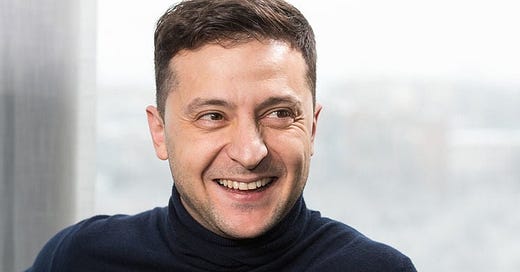Why Minsk failed: key events 2020-21
Zelensky's 2020-2021 transformation. The role of Covid in ruining Ukraine's 'Georgian scenario'. Russiagate, the Derkach leaks, Medvedchuk, Kolomoisky, Trump and Biden. Present lessons
Three years and one day ago, February 24 2022, I was woken up at 4am in my Kiev apartment. Amidst distant thudding sounds, my father called - ‘the war has started’.
Ten years ago, February 12 2015, the second Minsk Agreements were signed between representatives (with uncertain status - more on that later) of Russia, Ukraine, the EU and the separatist Donbass republics. They were intended to end the war in Ukraine by reintegrating the separatist territories into Ukraine with special rights of autonomy.
Clearly, Minsk didn’t work. I wrote a 4-article series on the factors on the Ukrainian side militating against implementation of Minsk. But now that many expect Donald Trump to force Ukraine to sign ‘Minsk-3’, there is no better time to return to Minsk, the turning points and missed opportunities that made the last Minsk unrealizable.
My series on Minsk focused on the broader, structural reasons why Ukraine’s post-2014 political class was unwilling to implement Minsk. In short, they didn’t want the Donbass to return to Ukraine’s body politic. So many working class, EU-skeptic, anti-NATO voters would have made it impossible for the victors of the euromaidan revolution to stay in power. They were already unpopular and only ruled precariously, through various techniques of electoral disenfranchisement.
Under the terms of Minsk such that the Donbass could have its own elections without Ukrainian military interference, Ukraine’s post-2014 political space would be democratized. A large scale alternative to euro-optimist neoliberal austerity would become possible, and their parliamentary power would be able to veto euro-atlantic integration.
Hence, Ukraine’s political class was happy for the post-2014 situation to continue indefinitely - no implementation of Minsk, keep the ever-present threat of war as an excuse to repress political opponents at home.
Minsk and realism
On February 12, the 10-year anniversary of Minsk-2, the Ukrainian opposition media strana.ua published an article on why Minsk failed. Strana, founded in February 2016, has been sanctioned by the Zelensky government from 2021 onwards. The Poroshenko government also arrested its chief editor, Igor Guzhva, in 2017. He currently resides in Austria. Strana was Ukraine’s second-most viewed news site in 2020.
Politically, strana’s views are similar to that wing of Ukraine’s politics often incorrectly described as ‘pro-Russian’. Incorrectly, because strana is in fact often quite critical of Russia, and constantly calls for an end to the war through freezing the frontlines at their current position instead of continuing the mutually destructive conflict.
The ‘pro-Russian’ wing of Russian politics was represented by the Party of Regions until 2014. After 2014, groups like the Opposition Platform For Life emerged, composed of the old figures from the now-defunct Party of Regions. The Party of Regions as certainly not particularly loyal to Russia, as seen in the fact that most of the Party jumped ship in 2013-14 upon western pressure, and simply by the fact that the ‘Russian puppet’ president Yanukovych spent years trying to get Ukraine into the EU, only changing his mind at the last moment.

The party was not ‘pro-Russian’, it simply represented the interests of Ukrainian big business. Their money lies in western financial institutions. They have always competed with Russian capital for the same metallurgical markets, and have often fought to prevent Russian capital from acquiring their industrial assets.
Now back to strana and Minsk. Strana, besides the same structural arguments I outlined above, has another, simply answer to why Minsk failed - no one in Ukraine’s political class believed that Russia would really commit to militarily punishing Ukraine for not implementing Minsk:
Strana and the political forces that supported Minsk weren’t ‘pro-Russian’ - they were simply realistic. They understood that there was a realistic chance Russia could take serious steps to enforce implementation of Minsk. To avoid such risks, the political democratization promised by Minsk seemed like quite a pleasing alternative.
As someone who participated in pro-Minsk protests and discussed the topic constantly with friends in 2021 and early 2022, I can say, personally, that we didn’t really believe the war would be as big as it ended up being. By late February, it became clear Russia would do something, but everyone assumed it would ‘just’ be a local war in the Donbass. Of course, that isn’t what happened.
But still, our overall calculation was correct - implementing Minsk would have been far better than the catastrophic destruction that took place instead. I think about this question a lot. I lost quite a few friendships and even my relationship with my father because of my support for Minsk.
But I feel entirely confident in my belief that a post-Minsk Ukraine looking quite like the post-Dayton Bosnia and Herzegovina would be far preferable to the present reality. A post-Minsk Ukraine, like Bosnia and Herzegovina, would of course have a quite fractured and chaotic polity. But in my view, chaotic pluralism is much better than hundreds of thousands dead. Of course, those who owe their continued position in power to this endless war disagree.
Zelensky and Minsk: 2019
But this structural explanation to Minsk’s failure isn’t quite satisfactory when it comes to explaining the 2019-2022 period. In 2019, Volodymyr Zelensky won the presidential elections on a pro-peace, essentially pro-Minsk platform, to the immense displeasure of anti-Minsk forces. And yet Minsk still failed.
This period of missed opportunities and obscure turning points fascinates me. Given how much Trump (not to speak of Zelensky) figures in these events, the period is more relevant than ever now. If you want to read the following 4,000 words on the key missed opportunities and deep political intrigues involving everyone from Biden to Trump to Kolomoisky that doomed Minsk, become a paid subscriber.
Keep reading with a 7-day free trial
Subscribe to Events in Ukraine to keep reading this post and get 7 days of free access to the full post archives.


